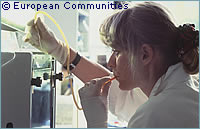Conference proposes themes for next research policy benchmarking exercise
Senior European policy makers have indicated that human resources and private sector research investment will be key themes for the next two year research policy benchmarking cycle. Their plans were revealed during a benchmarking conference in Athens on 17 and 18 January, organised by the Commission's Research DG and the Greek EU Presidency. The event had the double objective of reviewing the previous benchmarking cycle, which took place from 2000 to 2002, and designing the next. On the importance of benchmarking in policymaking, Research Commissioner Philippe Busquin said: 'benchmarking is about learning through comparison [...]. By identifying and disseminating best practices in cooperation with Member States, we can help improve R&D [research and development] conditions in Europe and foster the creation of the European Research Area.' Participants at the conference, who included national State Secretaries for research, MEPs and Commission representatives, produced a set of declarations based on their discussions. These included a consensus on the effectiveness of benchmarking as a tool in addressing the Lisbon and Barcelona objectives on economic competitiveness and research spending, and its usefulness in supporting policy making and realising the European Research Area (ERA). The previous round of benchmarking exercises examined public and private investment in research, the impact of research on competitiveness and employment, human resources, science and technology productivity, how to promote an R&D culture and public understanding of science. Potential themes envisaged for the next set of exercises are human resources in industrial research, the mobility of researchers, private research financing, scientific careers and graduate training, connecting science with society and how to counter 'brain drain'. Within these themes, specific topics could include policies for increasing R&D investment, the funding patterns of the public research sector, government incentives for public understanding of science activities, and science centres and museums. A number of government representatives stressed the usefulness of benchmarking as a tool for defining national policies. Gonzalo Leon, Secretary General of scientific policy in Spain said: 'benchmarking is one of several tools available to policymakers, but it is particularly useful because it provides a rigorous comparison of the different options open to them.' Tamas Balogh from the Hungarian Ministry of Education's R&D strategy department stated that: 'The benchmarking exercise has fed into the design of the Hungarian national development plan and the design of national S&T [science and technology] indicators. Lessons have been learned, in particular, on human resources, competitive spending and patenting.'
Countries
Greece



